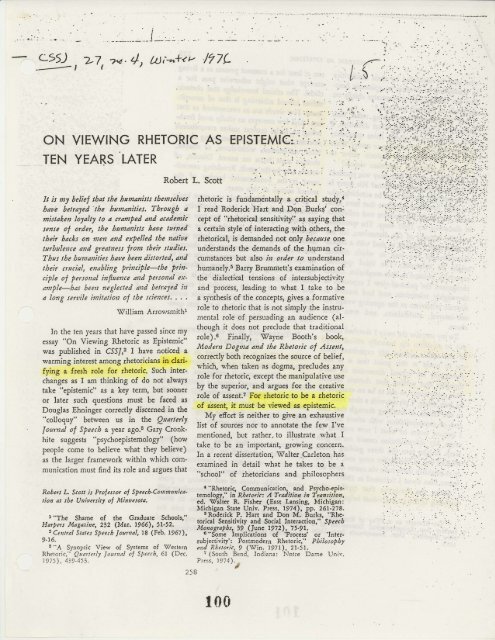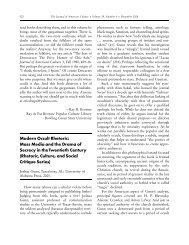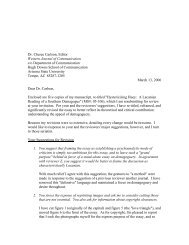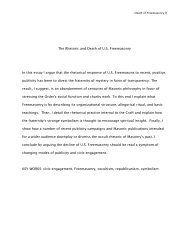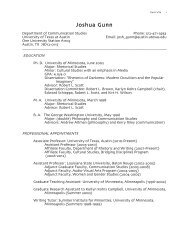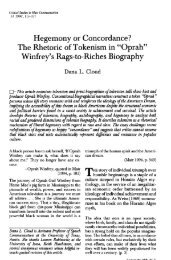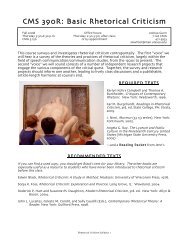On Viewing Rhetoric As Epistemic: Ten Years Later.
On Viewing Rhetoric As Epistemic: Ten Years Later.
On Viewing Rhetoric As Epistemic: Ten Years Later.
You also want an ePaper? Increase the reach of your titles
YUMPU automatically turns print PDFs into web optimized ePapers that Google loves.
I<br />
9 t<br />
27, *'4, aJi'..*
RHETOIJC<br />
AS EPISTEMIC<br />
s,ho may be identiied by their sirnilarities son at least for a rnoment Dossess as a living<br />
in attempting to att'troir"'itfitt*it<br />
r*t' ;;;At what migtrt othJrwise pass for a<br />
tion for rhetoric; r,. #.*,r"I*-Ji.ny<br />
oo ffi;:'Til<br />
knowledge that rhetoric<br />
;i* i"*ta "ttcai achieving is that of commit'<br />
the.work of Richard Mcl(eon's<br />
Mv 1967 t"^y **'l"ling rather than -tnt' nt* words are o*t'qotktd as that<br />
"I<br />
de6niti'e; oeither i, ttiPr'"i"g# ;-6"i,it.. I ;;;. And few conceptso vitally oeed fresh'<br />
Ji ,Silll,':ffi"Ht ;-+i ;1j"" -*:#[,iffiJ<br />
"s.::Tl'J-x #"f, filli.lT,,*,tf:::il.<br />
"i<br />
2t9<br />
: i*1,,:"lS'Th*:T^;.* pi,,*,,<br />
An early reader or,iT"Jft3 t-'ii ;*' ffi'*:;#.:;ff';|::X "JK<br />
1*i*ir in;'.1:-%::'."ilt"*1fl::fd ;;;i,;"n or this essav.<br />
a fair one; the answer<br />
ical. The questions<br />
"'#;;;<br />
raised constaotrv uv 'Jt"'<br />
f"ol *to<br />
io "*tnt<br />
or dissentn'Iy one must know<br />
"na toU'"got' r"n'ttJi*r':]t-^^"':L.iJf3{'$tT;t;<br />
in discussing -y rloi-t'*y'<br />
in scrence the agreeiltlt<br />
;*.I;Jj.f a*'.:t'ili1 l"'",t T:JJT ;Ji.q::4:i "i"I*' i'rp' "I'"r<br />
dirnension of tbe *"; ;;;J ,nioric l-i'J .on.loiion iust because the obsen'ers<br />
"<br />
;;il F ;q, rfii,Hi;}n:.:::kt i; j, ;:T[:i; i'::r:q':,?.:"','ll<br />
The questions' topic taken uP agiln<br />
t'p"tti^tty"po;ntll,lt-og-ut.*<br />
I expressed as iil;;<br />
knowledge<br />
"itt-t'<br />
-9*.tt -'-o,:t-1<br />
recognized the potnt'or-tt:*- ' .'"5.--'--; ,^ -^r .rhiral: ot creatrng<br />
thor-oughly ,.tr,i.,;riii^"ni'n^J i..rn.d.to ."i.tf,;*f ; it has the potential of creattng<br />
d i strust r er atiri sm' ;';'' :;J; ;" +:.t-11<br />
:"flTin';;tl rl' l*''<br />
5i?:"T;;l;<br />
Lii-i*t.u, wishfulness, and e'er sheer<br />
tion posed for this paper.<br />
chaos. -;;ry<br />
t L^---.<br />
surp.rise the essay I sketched turned<br />
Is THB' Oxr Vav or KNowrxc<br />
.";;; lt-'m;t the basically ethical thrust on Mar'rv?<br />
;;-;. earlier article' lry erytftft:-':11<br />
Many. Thus it is important to seek to<br />
J. io at this point that tt t"1: : ,,"r.;..*d ;.,od.<br />
"tttn "' a tiay not<br />
rhetoric t' of knor*'ing n<<br />
darnentallv ttnictl' dimension.<br />
""<br />
"1 -::-::l<br />
""it"*a<br />
"i'y<br />
thoughts<br />
that rheto'ic 'e\*'t'l fie way'This answer is ambiguous' Are the<br />
""a "aloil oi assertei "rnaoy r'ays" siorplv a multiplicity?<br />
This essay r...r,j'.Ji"'u" "".*"*pt.<br />
its or'n thesis' I s'iff;'+1'lY',Ti *'n;:? **-" E:iffi:.i'iiitf<br />
;it,*;:#f T,'*':irl"lq":.ifr*fir*f .*l;:$J':l:'i':,."J.<br />
*??*o"ta sav that there is a pruraritv<br />
;:X *;m*n::::1'ilir'."':i:':<br />
o.orked oJt in the :i ;;' F.", :f .::lll<br />
;::^;m U:"JJ,''Y. :"",111.i.'J':<br />
;X#l'*ii:Tffi:J:11"JTi9,11'"' festion I cannot 'n'*"' I suspect that anv<br />
Often the f"'hnt's that'$'pifies what as'are of and seeking 1e lrrork<br />
]t'*t'ttaty<br />
\nowing<br />
t' r"' t''ip' tn" #11<br />
"'''"ai.'iao't ff.'Ji1:l:i;,"":t#'ff:-:::tt""st";1l<br />
s..on Rh€roric. as a.'rrav e{. rTr':F;rt ,,:l,n* j:.::t.:',"'J,g,"'il'::r}?'i;<br />
I became a$late "i'"*tt<br />
i t"* consider an ordinate to' and<br />
,iu<br />
ig;-riiii.,ltffit$:1,:Xlrr3'1i"'"i,??i<br />
1975.<br />
uo,a.,[n" territory. Jean Piagei believes that<br />
I nl
260<br />
CENTRAL STATES SPEECH JOURNAL<br />
"eadr discipline sooner or later has to work<br />
out its on'n episternology." e Whether or not<br />
the "drearq" which does not seeo to Piaget<br />
unattainable, that is, "'traasdisciplinarity,'<br />
q'hich v:ould not only cover interactions or<br />
reciprocities between specialized'research<br />
projects, but would place these relationships<br />
within a total system without any 6rm boundaries<br />
between disciplines," l0 is indeed attainable,<br />
it seems to me better to concentrate<br />
on various ways of knowini without com'<br />
mitting ooeself in advance to some ardre'<br />
techtonic ideal.<br />
Of course traditionally, the notion of<br />
"knowing' that is not also bound to a final<br />
uoity is defectile. That position might be<br />
readily admitted except that it has tended<br />
to stop thought alongany line other than that<br />
that nrakes some imrnediate claim to rectify<br />
the defect. The result is s'hat Piaget, and<br />
rnany otJrers, call "reductionism"; just sudr a<br />
tendenq' is now s'idely held as unsatisfactory.<br />
Pluralism, on the other hand, can be<br />
taken as just another name for relativism,<br />
and once one has the latter label, it is the<br />
slightest step to insert the modifier "tnere"<br />
or even "vicious" before it. The ground on<br />
n'hich q'e rnay deal with dismissing or condemning<br />
a rhetorical relativism s'ill be the<br />
concern of the third section of this essay.<br />
In conduding this section, there is aoother<br />
ambiguity to consider: if the epistemic potential<br />
of rhetoric is one among a plurality of<br />
rla)'s of kno*'ing' is it a constituent of some<br />
acts of knowing or of all acts of knou'ing?<br />
Ansu'ering that rhetoric may be a constifuent<br />
of any act of knos'ing is perhaPs a more<br />
guarded claim than to say "all"; that answer<br />
is consistent rx'ith the notion of plurality<br />
since it does not preclude other constituents<br />
nor demand sonre proper scheme in which it<br />
e "The Epistcmology of Interdisciplinary Relationships,"<br />
id InrerdfucipliaairT: Ptoblems ol<br />
Teacbing and Retearcb in Uniuertitieq ed. L€o<br />
Apostel, et al., Paris: O6ce of Economic Co-<br />
Operation and Development Publications, 7972,<br />
^ 1 to<br />
'<br />
10 Ibid., p. 7)8.<br />
must fnd ie subordinatq articulated place.<br />
The daim is ooe tci potentiality rather than<br />
actuality. That is to say, that a rhetorical<br />
perspective will give one a purchase not<br />
otherwise available on q'hat may be known,<br />
but it is not dernanded to say tbat one<br />
"knows" at all. Rather, the attitude suggested<br />
by Hart and Brirks, "rhetorical sensitivity,"<br />
may be usefully extended to say that if persons<br />
take seriously the possibilities that may<br />
be opened by rhetorical interchange and their<br />
commitments to the reality of social life,<br />
then developing the seositivity necessarF to<br />
seek rhetoric as a way of knorving is to enable<br />
one to take rnore fully the responsibilities<br />
generated by living s'ith others.<br />
<strong>As</strong> Grace de Laguna writes, "There is a<br />
sense in which the hun:an being is born into<br />
a rx'orld constituted as human through the<br />
actitities of his forbears, and sustained by<br />
the interrelated activities of his felloq.<br />
beings. But it is not bil unless he makes it<br />
his, and it is only by enlarging his o'r'n<br />
being, to internalize the structure of this<br />
n'orld n'ithin hinrself, that it becomes his<br />
lx'orld." 11 Discovering and validating are<br />
reciprocal processes. <strong>Rhetoric</strong> is oni q'ay<br />
that ordinary human beings may quicken<br />
these. In seeing rhetoric from this angle as<br />
a u'ay of knowing, among other s'a)'s, one's<br />
vision s'ill be n:uch too limited by taking a<br />
speaker-oriented rhetoric only. An active<br />
auditor r*'ho seeks speakers is as real as<br />
speakers s'ho seek audiences; if there is a<br />
new, social rhetorig it must be rooted 6rmly<br />
in an enlarged notion of rhetorical roles.r2<br />
Wsar Sonr or KNowNc Dors<br />
RnrroRrc Srrrc ro AcHrrvr?<br />
If the recourse to a plurality of epistemol-<br />
1r Oa Existence and tbc Hlman World (New<br />
Haven, Conn.: Yale Univ. Press, 1966), pp. 104-<br />
10t.<br />
r: I havc tried to make this point several times.<br />
See my "<strong>On</strong> Nor Dcfning 'Rhe1oric,"' Pbilotopby<br />
and Rbetoric, 6 (Spr. 1973), 90, and tbe "col-<br />
Ioquy" between Ehninger and oyself (n. t,<br />
above). This thrust is clearly discernible in<br />
Cronkhite's essay (n. 4, above) and, although oot<br />
aln'ays explicitly, in the other q'ork I referred<br />
to at rhe outset of this essav.<br />
102
RHETORIC AS EPISTE}IIC<br />
ogi€s in claiming an episternic role for<br />
rbetoric is to poteotidity, the ctaim of knov'<br />
ing rhetoricaity it th"t of creatiog actuality'<br />
Seeing in a situation possibilities that are<br />
possibilities for us and deciding to act uPon<br />
iome of these possibilities but not others<br />
must be an irnportant constituent of what<br />
\\'e rlean by human knowledge. The plural<br />
pronoun in the foregoing sentence-is-vital.<br />
<strong>As</strong> social beings, our possibilities and choices<br />
must often, perhaps almost always, be joint'<br />
Tn'o qualifcations are irnportant to tfe<br />
claim made for rbetorig and both should be<br />
apparent from what I've argued already, but<br />
perhaps need to be made explicit: ceating<br />
situations as decisive and deciding arlong<br />
alternatites are not tbe concern of rhetoric<br />
exclusitely; seeing possibilities and maling<br />
decisions are not seguential steps in the sense<br />
of Srst all of the one and then all of the<br />
other but rather repeated phases that may be<br />
constaatly enriched in rhetorical interchange'<br />
It is precisely in understanding how human<br />
action is decisit'e that rhetoric makes its con'<br />
tribution to knowing.<br />
The position talien here, obviously, is one<br />
thet is Lecoming increasingly comnron: real'<br />
ity is socially constructed-ls But if one takes<br />
that position certain concomitants must be<br />
faced. Our freedom to decide questions, and<br />
indeed, rvhat we take to be problems Plesent'<br />
ing guestions to us for decision, are to sorne<br />
degree 6xed by historical forces that predate<br />
any of the lives of tbe actual persons that<br />
rnay be involved at decisive moments. The<br />
fact of having a culture with its traditibns<br />
does not seem problematic at all; what may<br />
be problematic is the very notion of freedom<br />
to Jecide guestions. Yet we notice that traditions<br />
do not simply exist, they are liled. A<br />
26L<br />
culture may precede and persist after any<br />
finite number of persons living in that culture<br />
at a particular time, but that culture<br />
must be lived to be a culture.<br />
In short, q€ can corne to grips with our<br />
tradition; it is from one aogle simply $ere'<br />
transparent because it is pen'asive. But the<br />
living of cultural demands makes them<br />
opaque to some degree so that they reflect, so<br />
to speak, what they are and what we are'<br />
Wtiat ;s rellected v'ill inevitably contain disparate<br />
features, and those features are what<br />
iu" .^tt treat as problen:s-to-be-soh'ed and<br />
take ourselves as decisive. Therein lies our<br />
freedonr, which, altlrough scarcely absolute,<br />
is nonetheless experienced and attested to in<br />
social drange.<br />
The opacity of living is n'hat bids fo*h<br />
rhetoric. A remark in passing by Hans'Georg<br />
Gadan'rer seens to n:e to be an in:portant<br />
insight: the "concePt of clarity beloirgs to<br />
the tradition of rhetoric." 1a But few terms<br />
are mole relative than that one nor call forth<br />
nrore strongly a human element. Nothing is<br />
clear in and of itself but in some context for<br />
some Persons.<br />
<strong>Rhetoric</strong> may be darifying in these senses:<br />
understanding that one's traditions are one's<br />
os,n, that is, are co'substantial rvith one's<br />
oq'n being and that these traditions are<br />
forrnatite in cne's otl'n liviog; understanding<br />
that these traditions are malleable and<br />
that one s'ith one's fellows rnay act decisively<br />
in s'ays that continue, extend, or truncate<br />
the values inherent in one's culture; and<br />
understanding that in acting decisively that<br />
one pariicipates in 6xing forces that will<br />
continue after the PurPoses for which they<br />
have been immediately instrurnental and<br />
nill, to some extent, bind others who will<br />
:3<br />
inherit the n:odi6ed traditions. Such under'<br />
Perbaps the best knos'n book that derelops<br />
the idea in detail is Peter L. Berger and Thomas standing is genuinely knowing and is knor*'<br />
Luclimann. The Social Conttruction ol Reality ing that becomes 6lled out in some particu'<br />
(Garden City, New York: Doubleday and Co''<br />
iq6e). See aiso Ernest G. Bormann, "Fantasy and tars by participating rhetorically.<br />
Rbet6rical Vision: Tbe <strong>Rhetoric</strong>al Giticism of If one sees rhetoric as a way of embracing<br />
-social Reatity," Qtarterly !orrnal.of S4lec!, J8<br />
(Dec.7972). 196'407. Jo! onc rhetortcrans de'<br />
.rielopment o? a schemi rhat is postulated directly taTrutb and Alethod, 2nd Ed., 1961, e-d.<br />
on o'hrt is becoming more and more strongly a Garrett Barden and John Cumming (New York:<br />
corlrerstone of contemporary thought.<br />
The Seabury Press, 1975).<br />
I a3
262 CENTRTL STATTS SPEECH JOURNAT<br />
a tradition such that one is able to accept or<br />
reject some of its demands and simultaneously<br />
to recognize that these decisions biod<br />
oneself to otlrers as well as to the past ia<br />
seeking chaoge, then the reasoos s'hy rhetoric<br />
is oaly potentially a way of knowing<br />
rnay also be seen. The possibility of failure<br />
is constant. Failure may result simply from<br />
ineptness or from the force of circunstaoces<br />
that defeat the best of intentions and efforts.<br />
But failure may also arise from ethical shortcomiogs.<br />
The task of tlre rhetorical theorist<br />
is to specify the values that will mark an<br />
ethical rhetoric and continually to try to<br />
rescue these from the realm of easy dich6.<br />
The indirect method of each of these three<br />
sections is an efrort to meet that task. The<br />
values will be labelled expliciily in the conclusion.<br />
Thus far I have used the terms "knon'ing"<br />
and "understanding" as if they q'ere inter-<br />
common intersubjectire devices of science ne<br />
see at least dimly the epistemic role of rhetorig<br />
for all of these depend on communities<br />
changeable. Although I may have been correct<br />
in respect to ordinary usage in doing so, exist automatically "in nature," so to speal:.<br />
of experience and connritment that do not<br />
still the words do carry somewhat different but are fornred as all comn:unities are<br />
rveights, or can be made to deviate some*'hat formed, by tlre interactions of plople. Altlrough<br />
many aspects of the interactions that<br />
from one another, and the nuances that seem<br />
to me to cling to "uoderstanding" make me n:al:e scientifc comn:unities, e.g., the "invisible<br />
colleges" that some historians and socio-<br />
prefer it to ascribe to rhetoric as epistemic.<br />
By "knosving" n'e may stress a sense of Iogists of science are fioding so significant<br />
from-the-outside-in, taking knowledge as an<br />
external ancfror point that rnay bring one<br />
ioto a consistent relationship v'ith the world<br />
that is rnore than oneself. By "understanding"<br />
we rnay stress the sense of from-theinside-out,<br />
taking understdnding as a human<br />
and personal capacity to embrace s'hat is<br />
outside the self, creating rather than finding<br />
meaning in the s'orld.<br />
The problem is the ancient one of the<br />
objective and the subjective. Today it is<br />
nearly cornrnonplace to assert that those<br />
terrns are af.ter all dialectical terms; neitl:er<br />
makes sense rn'ithout the other. An object is<br />
an object only to a subject; and a subject can<br />
be subject only if it is able to contrast itself<br />
n'ith.,.to differentiate itself from, objects. No<br />
one need doubt the pon'er of "being objective"<br />
since that attitude has been a driving<br />
force behind modern science and tcchnctogy.<br />
But it is an attitude that places subjects io<br />
certain relationships for certain reasons, in<br />
short, the zubjective remains and is often<br />
today recognized in the intersubjectite. fntersubjectivity<br />
in science is continually appealed<br />
to in sudt devices as "agreement arnong<br />
obsen'ers," "replication of experirnenb,"<br />
and 'professional standards of judgment."<br />
Again a. diatectic is suggested in the opposite<br />
expressions of intersubjectivity as the matter<br />
n'as put in the introduction of this essay.<br />
It n'ill not do, hos'eter, to press the opposites<br />
in the dialectical tension rather thrn<br />
the integration possible in individual a:tions.<br />
Those actions, indeed even of scientists,<br />
create traditions and comrnunities. In the<br />
these da1's,l5 are not rhetorical, other aspects<br />
are.<br />
Stephen Toulmin has ren:arked sharply on<br />
the strange dupleness that inflicts our peiceptions<br />
of what we call linowledge on the<br />
one hand and our sense of self as "knower"<br />
on the other. "In principle," he *'rites, "a<br />
proper grasp of our epistemic situation<br />
should reinforce confdence in the bestfounded<br />
of our beliefs; in practice, it often<br />
Ieaves us in a beg'ildered and universal<br />
skepticism." ro The way out of this impasse,<br />
Toulmin suggests, is "to bring to light . . .<br />
15 Sec for example the "Postscript-f 969" to<br />
Thomas Kuhn, Tbe Sttuctsrc of Sciintifc Repolutiant,.2nd<br />
Ed. (Chicago: Univ. of Chiiago press,<br />
1969), pp. 176-177,<br />
's Human Understanding: Tbe Collectiz,e IJse<br />
i!!, ",1' fli !:,i.,"<br />
L,S: T !::,,!1'j<br />
i:T:1. "'*<br />
:-- ..,..<br />
. ..- .... .-......:... .. . :<br />
:.: : :..: .'<br />
.. -... :.<br />
__."'.',.." ;":'<br />
_.<br />
..:<br />
.<br />
-. .:i .:'_.:..<br />
..'it ..:,"ii.':--;,1..::;..:','.-'.' :)::-'.-:i<br />
..";'.."::: -<br />
-'-....::,.. t.:-l.i'..'-' J.:.-.;.:.-:' .'<br />
-:.1'-- _:r., ".' .t:.r.'.:.--,..'.'r.. . '.L'-'...:..:<br />
q.,i: 1',',:1 -:;::<br />
;..i;:.;:.,:':<br />
:l.--.:-'<br />
.,, l<br />
\..;;r.. :.:t,: ;'.. i::.::'.:: : ::'. i::. j.,':.i:<br />
:,r.<br />
; :-.:-,,t,;,<br />
-,;;;-;',-,:.';. \.,'',.'.:..t;'l'-;i:;<br />
::j..$..r.'..- a.,<br />
ti :';;t.. ;....i3 ::,::!l:,.'-;.'.;i;ii';;:<br />
l;.:.,.r.'.":.::.-;';:;i..i L..;l --, .''.';,;-''-'-: :<br />
'Yi<br />
-i:"-;;1j!;1riii,*i':ti:i-.:*-ir:,.li'=<br />
"r:...:::'jr: iil.';1:; .::,'t;i;i:.i; --;;:':'-1<br />
:i ::i.:l::::"t?:::i1<br />
- L' i: :;' i:5i, -':1,ii.::a-,<br />
1i:' :'. ' '-.:'.:i -'::;-.-:i<br />
! -. ...;,,i,:;,..:_;.1.1'.:'-j:;i:<br />
:{:j.ii::::<br />
.. .:,,i:i:-t;1,i,;:i:':'*t:ii*i:.:.n<br />
i:,'ii:,'.1:;i;":i!' !l':t :rr'i;i::.': i:::,:r".i'<br />
. --...:':.-"::"'jr.;.: . -. L ,.,.. :.-_.:. .. .:<br />
_ .: r:<br />
:..- ... r . :. . . -' .r.j. :<br />
::..: ::" r-.-.:.-'<br />
:-:'l;:::.'i'1':.1:i;: ; ;:-..::1.,.-',,<br />
:. -'.:..::'.-: .,.-. .'.:-:. ,j.--'rti .--.,.-.i;i;i .l<br />
i.''::",iil':-::,:,'*..:;'1;'!;i- ;:;;., iiii :.i<br />
..'.:-:..j...i:i j::..:::.:..:.-..-...'j..':j_ :::!-..<br />
..j.t. ::..1' ... ....:.:.-' -r::...<br />
. i ..: -;,. :..:..:i... - . .. ....r-.<br />
...'-:..... ':-:.::':.".:"'i"<br />
':'<br />
:<br />
..<br />
:'_<br />
"<br />
.:'j :<br />
:':::-.- j.:<br />
'.<br />
.<br />
"";<br />
..-: i::.: i: .1 :.-.: :: .<br />
' . : : . ... i....:.:<br />
J-;.<br />
. --:-_<br />
..<br />
'_' '::'::'-"-:::--<br />
..:' : -.:.: _-..:.<br />
"<br />
':"' "<br />
"l^4
RHETORIC AS EPISTEMIC 263<br />
fan) epistemic self-portrait: the partia:Iar<br />
picture of human beings as active intelli'<br />
gences which govems his stance toward the<br />
objects of human understanding." 17 My<br />
daim is that any "epistemic self'portrait"<br />
that approaches completenesi must include<br />
rhetoric.<br />
'\tr7hat sort of knowledge does rhetoric seek<br />
to achieve? fie understanding of what it<br />
means to be persuaded and to persuade.r8<br />
Such an understanding is both general and<br />
specific: general, ia that one's on'n grasp of<br />
oneself as a social being with others in society<br />
is essential to being human, and specific<br />
in that one must continually face concrete<br />
sihrations in which one will act to aftrm<br />
son:e commitments. None of these statements<br />
is n:eant to deny that one will continually<br />
behave scarcely aware of the patterns that<br />
behavior takes let alone with highly conscious<br />
grasp of the reasons for those Patterns.<br />
But the fact that much, probably nrost, of<br />
our behavior is rvell fixed through complex<br />
reinforceorents does not mean that s'e cannot<br />
become focally al'are of these patterns and<br />
their consequences. .tiThen we do become so<br />
an'are, tben we can act critically, and usually<br />
rhetorically, to reafirnr or modify tlrem, in<br />
short, to b:come n:ore fully committed.<br />
In an analysis much like the one here,<br />
Thon,as Farrell pictures the Cartesian bequeatbed<br />
attitude of detachment as descriptile<br />
of modern science. Farrell would rnove<br />
beyond that attitude in assessing the rhetorical<br />
dimension of social knowledge as taking<br />
a community of belief as necessary.le The<br />
requisite attitude to balance detacbtnent in<br />
tz lbid., p. 3.<br />
18 Hcnry \7. Johnstone, Jr., has written that<br />
"man is a petsuiding and'pirsuaded animat, and<br />
. . . v.'henever he steps outside the forum in<br />
which rhetoric loses swiy. he is in dangcr of losing<br />
his human dignity." "The Relevancc of Rhetorjc<br />
to Philosophy and of Philosophy to <strong>Rhetoric</strong>,"<br />
Quarteill fournal of Speecb,52 (Feb. 1966),45.<br />
:e"Knos'ledge, Consensus, and <strong>Rhetoric</strong>al<br />
Theory," Qaarterly Jounal ol Speecb, 62 (Feb.<br />
1976), see esp., 6-7, altbough thc entire essay is<br />
highly pertinent to grasping the idea of rhetoricas-eoistemic.<br />
knowing would be attacbtneil in uoderstandin&<br />
Although modern science is founded on<br />
the firm belief that experience must be instructivg<br />
Haas-Georg Gadaner argues that<br />
the $'pical attitudes of science leave "experience"<br />
incompletely understood; he undertakes<br />
to rectify tbe situation. Among his<br />
remarks, this ooe is particulatly trseful: "Experience<br />
teaches us to recogoize reality. Ifhat<br />
is properly gained from all elperiencg then,<br />
is to know what is. But 's'hat is', here, is<br />
not this or that thing but 'what cannot be<br />
done away q'ith'. . ." 20 \Phat cannot be<br />
dooe away with in a community is commitment<br />
to the norms of that community. Commitn:ent<br />
and rhetoric stand in a reciprocal<br />
relationship: commitment generates rhetorig<br />
and rhetoric generates commitment<br />
Is Rgrronrc.'lr- REL.{Trvis}{ Vrcious?<br />
No. <strong>On</strong>e may, of course, eat gluttonously<br />
or quote Shakespeare 6lled with vain pride<br />
in the sound of one's own voice. Likenise<br />
one may argue with s'anton disregard for the<br />
fabric of social comn:itments or, pcrhaps, in<br />
blithe ignorance of the possibilities of either<br />
reaffirrnation or reform. But the grafuitous<br />
abuse of rhetoric seen:s of tess concern to<br />
thoughtful people than the sheer relatilism<br />
of the point of view that takes rhetoric as<br />
episternic. For tbese people, relativism seems<br />
to make abuse not simply an occasional occurrence<br />
but likely. At least sucJr objections<br />
are t1'pical of tlre discussions I hate often<br />
had n'ith colleagues and students since my<br />
effort in L967.<br />
The difficulty rests in the belief that rela.<br />
tivjsm obviates the lery idea of knon'ledge.<br />
From this point of view knowledge must be<br />
a priori, that is, s'e must know in sorne general<br />
or unitersal sense, before q'e can know<br />
at all in any specifc sort of way. This point<br />
of view seerns to be entailed in the traditional<br />
way of putting the question, What is<br />
knos'ing? The question itself suggests that<br />
.sTtr:h<br />
cnd .\ttthod, p. 120.<br />
i'i;'..<br />
,l<br />
;; '<br />
I45
. .:,., ...-- ...-.-.' . : -:::.,.:-;.'-::- .<br />
\""<br />
:"' 1 -: s1l'... ''.-'; -::-. : ':<br />
:,<br />
.:..,-;_'<br />
.r'i,<br />
!tiri.'i'<br />
'.;=t' .<br />
264 cENrn {L sr^rEs spEEcH JouRN.{L<br />
\t,::,:1i;.;t1t:ifl:,it;=a:,i:,-.:<br />
::i1r,,::;.<br />
the best answer, perhaps the ooly answer, is when that injury is wide scale finding ex'<br />
\;;i,:rlil.ii..t;'.,;.li':;'.;:tlL.:].:'ft;,t.<br />
defning knowing as a state-of-being and, in pression in social and econornic dominance<br />
-!-..:::j;1:!+:.r;ii-i:.:'i.':: ::i.t,i.:::,;.j<br />
dariffing the answer, indicating the condi- or violencg is ordinarily rooted in the cer- "tii.l-;:tlL:*i;:i=:.-..:l:li.;.':l;i;'-.'.i'i;<br />
tions for that state. However, such moves tainty of some corffnanding Truth takeo as *ri::l:iii:'.5,ii;'-A:','-:...r.-.-i.'..:.;:<br />
inlolve us in ao infnite regress unless n,e axiornatic. The fact that one group, especially<br />
ifl':i::iir.i..i-i".i:,::':l;; l:;j;i<br />
take sorne conditions as clear and necessary, at sorne later point in time, is indined to<br />
ji';;:;.:..;i;:i;:;..;ii::t;,:;.;i1',;,,:;:'<br />
j:.;ii:..:--.1;.r:ii.;.;::.;:-;::;.ii:i::;:;:-'<br />
that rt is, as axiornatic.<br />
give unpleasaoi<br />
unpleasaDt o"..t narles to the ideas rdeas of ot order orde!<br />
:iliiliiiiiilt..:#i=it-..,-+i"<br />
:,;{:iil;ii:ii;-.1:i:ii.,ra,.;::iiiii.;i1:,<br />
An axiomatic point of view can be taken that have driven-othe-ts:-for erample,,blam- ";ii:ii:i.;i:;.:j'--,,.i"'i:i,.,:,,.-,:.:<br />
as either substantial or nrethodological. It ing the horor of religious *"rs ot mistaken ;;;;i=;i;i,..-:i.rt:::.j:.:l.L:.:::';:'.<br />
temologrhashaditsgreatestmodernimpact, tainty as enabling extrerne actions. If one<br />
..'...,::'ii,-.i;;,,,:i.iji{i".;:1.:<br />
ternologl nad rts greate$ mooefn lmPact, tarnry a5 €naDirng cxlrerllc aLlruus. u uus ."..j:-:-:::<br />
;iii;;i<br />
that is, in the ideal of "scientifc method." may repair to standards of judgmenthat are<br />
'1.,,,ii.:<br />
\7hat bas been the predomioant interpreta- fixed outside the individual conscience or<br />
t:,;,,1:,;,i,1,;:i:,.ii:,:li,--,,i',,<br />
I r :- : ...,-.. .:-:,!i.-7<br />
tion of such a method, however, is sharply even the interests of an iotmediate com-<br />
,,;::..:'';r';':::;:-;.,i':'::r.:':':"''::<br />
under attack today.21 nruoity, then one does not bear the burden .-. '. :.:.,<br />
',,,;<br />
Taking prior axion:s, io either a substan- of responsibility in making decisions. It is<br />
111...,...i1;1,':<br />
"., .:.-:<br />
tial or a methodologicrl sense, precludes that relief from individual or conrmunal<br />
:'::""':'::;''1.'1 .,:',.,,'<br />
rhetoric's claim to being episteniic.^And the responsibility that is the chief attraction of<br />
''..:.,'.::..-,,''.':.'<br />
''..<br />
in:plications of a rhetoric based on sorne s'hat is sonretimes called, I believe mis-<br />
.:.; ,....:',<br />
:-: ,'1.1:<br />
prior, enabling sense of Truth are ones that takenly, "objective<br />
'<br />
reality."<br />
.: , ' ' -<br />
"<br />
i.rron, in oui 6.ld have ofien accepted un- Although clearly I cannot detail an accritically;<br />
this point I argued tn Dd. count-book for human history and must leave . .<br />
Fundamentalli', the objeciion to relativisni my appeal to the reader's os'n sense of hisis<br />
that no standards for judgment are pos- tory, ei'eo in the abstract it seems to me that<br />
sible and therefore sheer chaos js loosed contingency is much less to be feared in<br />
among humankind since reduced to opinion creating chaos, wantonly or whimsicalll', than<br />
:<br />
alone no opinion can claim legitimately any the spirit of axiomatic detad-rment. j, .;, ..-.,,.,,,.,.,..<br />
priority over any other opinion.<br />
A second line of argument to relieve the ,. .. . '<br />
At least tno counter-irguments may be stign:a of relativism runs precisely contrary ' , -. :':.,'-,r;,,,,..,<br />
'1<br />
posed againsthe abstract and deductite fear to tlre supposed self-evident assumption on<br />
:--..:':<br />
".i' .;<br />
of relativism; both arguments appeal to com- n'hich the stigmatizing rests. Relativism, sup-<br />
' ' - ." -' :',:: ,'.<br />
rnon erperience and both seem to nre potent. posedllt, tneans a standard-less society, or at<br />
, , ' . '' . .' , . .1' ',<br />
-,-'--.'.':'..'.;'.<br />
Although no one needs to doubt the leastamazeof differiogstandards,andthus<br />
- -;-<br />
setere shock of s,hat is oftend called "sense- a cacaphony of disparate, and likely selfish, .<br />
'<br />
'<br />
less crime," the greater portion of elil in the interests. Rather than a standard-lessociety,<br />
.,<br />
'.<br />
"'1 '<br />
-. ' '<br />
. , ",<br />
history of humankind stems from what its n'hich is the same as saying oo society at all, , .' . - i.':" ''<br />
perpeirators take to be quite good sense. The relati'r'ism indicates circumstances in which - . .' - ':: ''.i'<br />
justification of injury io oth.rr, especially standards have to be established coopera' ..,.1:.,'"'.'r",',''--'<br />
':-": -'i'-'<br />
tively and renen'ed repeatedly. Since agree-<br />
:':-<br />
:1 The literature that might-be ciledJrere js<br />
ment seems to be at least as common in the ...<br />
tast.ThebooliscitedabovebyKuhnandToulmin a -rt r!--, . | ?.r<br />
in-ip...1".o'ii""'lill"ii-*. r"i e'r'eq,lxy rx'orld as disagreernent t_n!,<br />
";;-'r;t.r'ant:<br />
{ut!*: . .., , ,-...<br />
fl-d-,11.,.oA:g:^,1''l1,Tq:9:1{,-{"-*:'11:d.il necessary to the working out of individual ''.. ';..-,' '.- - .'.'<br />
Daniet J. O'Keefe, "Lolical Empiricism and thl<br />
: : : ,,-: --_ ,_ ^r--_^-:-r- -t-, -t -^-:^L:^^ . i.,.<br />
st"ai-"i-ir'..o co.'i"i?'"ti;;i:';;;;;;'^\";;: interests even in the most simple of societies, . . . , i. ' .<br />
t^if*, 1:-9:l-]!l1l:-!u,e-]I 1f:,t:',1*:'.: relativism s'ould be likely to quidien a sense . ,' i lcI4(l r rJrrr<br />
.., , . ri<br />
of the current reassessment mav be sc.en in thc<br />
essay-review by Gerald R. Millei, "The Person as ot conmttment tO C!€atlng agreernent.<br />
Actor-Cognitive. Ps1'chotogy. ol_ rhe Attack," To accept relatiyism Coes not mean start-<br />
Qaarreiy lotrnnl of Speecb,62 'J' w' (Feb. \t'p' 1976),82- t/twt' o'- l<br />
s7.<br />
ing continually from scratch but ratl-rer re-<br />
1n6
,.:.-:<br />
cognizing one's traditions as such, recognizing<br />
that traditions need to be lived to be<br />
traditions, and, further, teaching one tbat<br />
one's traditions are only traditions.<br />
Ironically enough, one inteqpretation.of<br />
relativism rather than casting individuals<br />
a&ift in a standard-Iess world, fixes tleo<br />
in a strict determinism. This sort of relativism,<br />
often called "historicism," emphasizei<br />
the immediacy of one's own history and that<br />
of one's particular culture. 'We are what we<br />
are because of what our forebears have been;<br />
s'e act as we must given the expectancies our<br />
particular lives have endowed us with and in<br />
accordance with the limits of our societal<br />
noffns. Other persons and other societies<br />
differ from us because of their cultural<br />
deterrninants. \ro culture can claim anv rational<br />
priority and any contest of interests<br />
mtut be settled by s'hatever tests of sheer<br />
strength t}at may be brought to bear in<br />
the circumstances.<br />
<strong>On</strong>e need not deny historical detern:inism.<br />
<strong>On</strong>e only need to denl', and I have tried<br />
consistently to do so, the rigidity of sudr<br />
determinations. Shifts in cuhural consciousness,<br />
both revolutionary and evolutionary,<br />
seem consistently present in human experieoce.<br />
Furthermore, n'hat q'e call "a culture"<br />
or "a society" is marked only rnore-or-less<br />
distinctly; or, to put the matter a little differentll',<br />
there are rnembranes that bound the<br />
circumferences of such bodies, but these<br />
membranes are permeable.<br />
lr{y suggesting that there are tq'o dimensions<br />
of relativism-that among societies and<br />
that s'ithin a socieg'-probably has not relieved<br />
the tension felt by those q'ho use the<br />
word as a pejorative or who fear being so<br />
labelled. And there is a third dimension.<br />
Even those u'ho take the position that<br />
there rnust be some unifed hierarcJry of<br />
stable standards in order to achieve decent<br />
individual and social liles s'ill agree that<br />
such standards must be applied in specific<br />
sets of circumstances. few w;ll argue that in<br />
practice, at least, applications are seldonr, if<br />
RHETORIC AS EPISTEMIC 265<br />
ever, possible in such a way that the standards<br />
are engaged without discornfort Somi:<br />
degree of discomfort seems inevitable in the<br />
very necessity of having to make a judgment<br />
Tlri existence of some set of circunstances in<br />
the guise of a case to be settled seerns to<br />
suggest rather strongly the human participatioa<br />
of relating standards to partianlar, concrete<br />
events. Of coiuse one might say wishfully<br />
that if we possessed knowledge of the<br />
propet sort then no sudr cases would arise<br />
for the judgment of sorne parts of society<br />
by other parts. The dialogue in Plato's<br />
Gorgias is actuated to a rnajor degree around<br />
the proposition attributed to Socrates that<br />
the wrongdoer should prefer punishrnent to<br />
escaping punishment. I call that argument<br />
q'ishful since it may be interpreted as relieving<br />
members of a society of the burden of<br />
making judgments of others. That burden<br />
is particularly beary if one is convinced of<br />
the contiogen cy of any judgment.<br />
, None of the foregoing is intended to<br />
deprecate self-criticism. Rather I hold that<br />
a community to sustain itseif, both through<br />
reafirmation and reform, must be forrned<br />
of rnernbers r*'ho n'iil take the responsibiliiy<br />
of examining critically the binding forces,<br />
the norms, of the community and of recognizing<br />
that the traditjons accepted and extended<br />
eotail living consistently with the<br />
social demands. The task is not lightened by<br />
recognizing that social demands can be repressive.<br />
<strong>On</strong> the other hand, as important as<br />
self-criticism may be, we should also recognize<br />
that a community may impose its dernands<br />
quite invidiously by insisting on<br />
self-criticism as an instrurnent of social conformity.<br />
<strong>Rhetoric</strong>al relativism is not an easy process<br />
promising dependable outcomes. It may be<br />
just as well that the very label tends to make<br />
us fearful, for that emotion may be an indication<br />
of reluctance to impose solutions<br />
rather than to create and share them jointly.<br />
The attitude suggested is that appropriate to<br />
talting the responsibility of persuading others<br />
1^?
: -- -.:.- . .- -,- I<br />
). :-'r. .. r-..:;'.'-. t' :."."- . : . :'<br />
266 . CENTRAL srATEsPtEcH:JouRNAL<br />
i,:':i.' .'..;; "-t".;1';.-.t..- ..-,:''.<br />
and;.concomitantly, being. open to perzua- munjgy is.assured..Put difierently: rhetoric i' i:'.,';-;,.t..;,-...:..'.:'1,'.,:.<br />
sion.. .. - ...- /l:.=:::;'-.,:.i!::;i:.i:i1'.''q;.:'.irt,<br />
: : rntf b. the art'of persuasioq thai is, it.cnay<br />
:.;,<br />
: j : -' ,.. . :.'. '.';':-r.'^::.:';,';;i;j:i1:r'i.<br />
beseenfromoneangleasapracticalcapaciry<br />
i:i'.11::;r: .':-,,-.<br />
.: . :<br />
coNclusloN, .. to find oeans to ends on specific occasions; ;i:l:,i;ji::litl;,1;i:;;1.;,-.];..qi.1"r-.,<br />
,, l" tgg, I argued that understanding rlrer- but rhetoric must also b. rio rnore broadly<br />
!i..,-...1i{:'t:lil;:.,ir..i:.,:;5'. "t':t:i<br />
oric-as-epistemiienthiledthreevalues:-toier-<br />
a human potentidity to'uaderstand the<br />
-r:::-';;:'1.'.;1;;';.i;..;t:i;,;r;,i..i,,<br />
anc6, wiil,.and iesponsibitity; In answeriog human conditioo. : .. :' til;,1;:,li;:i.:i:!.t*r,;.r.,i.ir;iii;r1i,.<br />
"<br />
the three guestioosihat I posed'at the'outset It is the broader scope of rhetoric that has<br />
JL,:.-i,:,i:i;ti:.:';i;i.;'"'':,;'';':"'':<br />
oT this essay, I have tried to argue in such interested rhetoricians-intensely in the lasb - l:"i"'i"'-''''"-::'''<br />
a \eay as to reamirh tlrese valuei in tum as decade. Recently Donatd P. verene has writ.<br />
iii:ftii;ttiii,*t,:ii;,.i,<br />
the logical outcomes of the analysis in eadr ten that."the philosophy of science and ilr-e ".:',,.t.';-'.:,.:l:::;,1:.i:iii'l:".ii,::i:i;<br />
of 'thi threi sections abore.'Tiese .,,"loes scienies has become a defoite field of phi-<br />
:::''ti..i.j;:.,,';i,i",,i.:",',r',i.:,,:.:<br />
should haie meanings for individuals, but losophical ioquiry; a counterPart to this,- "<br />
j,';til'::i,;l 'i-tl"<br />
"::; '';,.'":::-':':<br />
they haYe meaning only in a riality that is philosophy oi th. humanitiei, has not de'<br />
''ii ':'i:;:.ii.i:irlt'.;r,;;i:.',.,ii:.,.j<br />
social. If Gadamer is correct in saying that veloPed-" 23 Verene q'ould see such a phi'<br />
"thi experience bf meaning .,*,hich-takes losophy develoPed, and it is in this relation i-<br />
place io understdndiog alo,ays includes ap- that vien'ing rhetoric as epistemic becomes 2. ::'".;r;:';:'.-.:';;,;::,i<br />
,i.'-'1:'::''.:':<br />
'"::' " :':<br />
'r'ital<br />
plication,"22 then ihetoriC as a meanS of concern<br />
-..'.'.<br />
i,.-...-,,,'.:.t',',i.::::. ;..,'<br />
n:eans of acting effectively s'ithin a conl-<br />
- zs "Vico^'s philosophy gt_ Humaniltic Imaginaj<br />
tion: Its Significance for Theory of Knowledge,"<br />
ttitj.o"'""1' in press (scheduled for Fall'<br />
2?Trtrb and rIcrbc,d., p. 145.<br />
,. ...'.t -<br />
. :l ,<br />
.,'...1,..,<br />
i ".---<br />
tng


